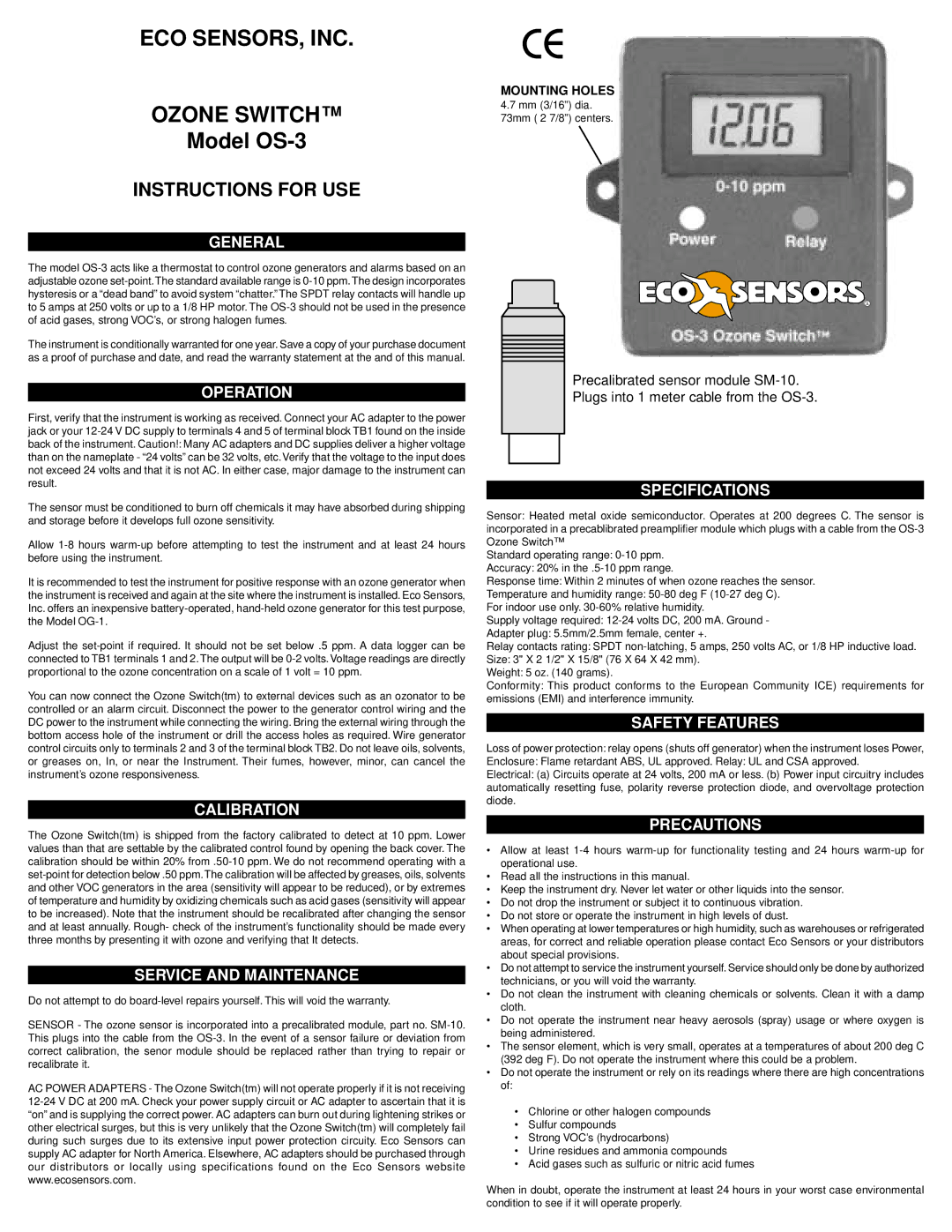
ECO SENSORS, INC.
OZONE SWITCH™
Model OS-3
INSTRUCTIONS FOR USE
GENERAL
The model
The instrument is conditionally warranted for one year. Save a copy of your purchase document as a proof of purchase and date, and read the warranty statement at the and of this manual.
OPERATION
First, verify that the instrument is working as received. Connect your AC adapter to the power jack or your
The sensor must be conditioned to burn off chemicals it may have absorbed during shipping and storage before it develops full ozone sensitivity.
Allow
It is recommended to test the instrument for positive response with an ozone generator when the instrument is received and again at the site where the instrument is installed. Eco Sensors, Inc. offers an inexpensive
Adjust the
You can now connect the Ozone Switch(tm) to external devices such as an ozonator to be controlled or an alarm circuit. Disconnect the power to the generator control wiring and the DC power to the instrument while connecting the wiring. Bring the external wiring through the bottom access hole of the instrument or drill the access holes as required. Wire generator control circuits only to terminals 2 and 3 of the terminal block TB2. Do not leave oils, solvents, or greases on, In, or near the Instrument. Their fumes, however, minor, can cancel the instrument’s ozone responsiveness.
CALIBRATION
The Ozone Switch(tm) is shipped from the factory calibrated to detect at 10 ppm. Lower values than that are settable by the calibrated control found by opening the back cover. The calibration should be within 20%
SERVICE AND MAINTENANCE
Do not attempt to do
SENSOR - The ozone sensor is incorporated into a precalibrated module, part no.
AC POWER ADAPTERS - The Ozone Switch(tm) will not operate properly if it is not receiving
MOUNTING HOLES
4.7mm (3/16”) dia. 73mm ( 2 7/8”) centers.
Precalibrated sensor module
Plugs into 1 meter cable from the
SPECIFICATIONS
Sensor: Heated metal oxide semiconductor. Operates at 200 degrees C. The sensor is incorporated in a precablibrated preamplifier module which plugs with a cable from the
Standard operating range:
Accuracy: 20% in
Response time: Within 2 minutes of when ozone reaches the sensor.
Temperature and humidity range:
Supply voltage required:
Adapter plug: 5.5mm/2.5mm female, center +.
Relay contacts rating: SPDT
Size: 3" X 2 1/2" X 15/8" (76 X 64 X 42 mm).
Weight: 5 oz. (140 grams).
Conformity: This product conforms to the European Community ICE) requirements for emissions (EMI) and interference immunity.
SAFETY FEATURES
Loss of power protection: relay opens (shuts off generator) when the instrument loses Power,
Enclosure: Flame retardant ABS, UL approved. Relay: UL and CSA approved.
Electrical: (a) Circuits operate at 24 volts, 200 mA or less. (b) Power input circuitry includes automatically resetting fuse, polarity reverse protection diode, and overvoltage protection diode.
PRECAUTIONS
•Allow at least
•Read all the instructions in this manual.
•Keep the instrument dry. Never let water or other liquids into the sensor.
•Do not drop the instrument or subject it to continuous vibration.
•Do not store or operate the instrument in high levels of dust.
•When operating at lower temperatures or high humidity, such as warehouses or refrigerated areas, for correct and reliable operation please contact Eco Sensors or your distributors about special provisions.
•Do not attempt to service the instrument yourself. Service should only be done by authorized technicians, or you will void the warranty.
•Do not clean the instrument with cleaning chemicals or solvents. Clean it with a damp cloth.
•Do not operate the instrument near heavy aerosols (spray) usage or where oxygen is being administered.
•The sensor element, which is very small, operates at a temperatures of about 200 deg C (392 deg F). Do not operate the instrument where this could be a problem.
•Do not operate the instrument or rely on its readings where there are high concentrations of:
•Chlorine or other halogen compounds
•Sulfur compounds
•Strong VOC’s (hydrocarbons)
•Urine residues and ammonia compounds
•Acid gases such as sulfuric or nitric acid fumes
When in doubt, operate the instrument at least 24 hours in your worst case environmental condition to see if it will operate properly.
